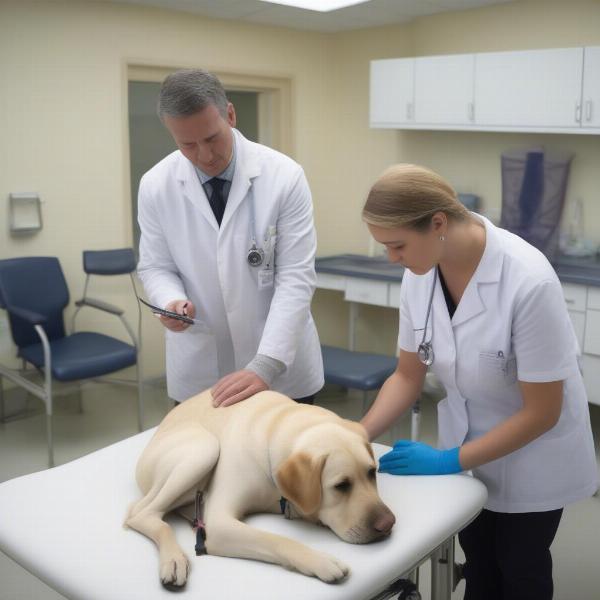Labrador Retrievers are consistently ranked among the most popular dog breeds worldwide, cherished for their friendly temperament, intelligence, and trainability. For breeders looking to contribute to this beloved breed, selecting the right lab stud dog is a crucial decision. Choosing a suitable stud involves careful consideration of various factors, from health and temperament to conformation and pedigree. This article provides valuable guidance on navigating the process of selecting a lab stud dog, ensuring you make an informed choice that benefits both your dam and the future generation of Labrador Retrievers.
What to Look for in a Lab Stud Dog
Finding the perfect lab stud dog requires more than just a handsome face. You’re looking for a dog that embodies the best qualities of the breed, ensuring healthy and well-tempered puppies. Health testing is paramount. Responsible breeders prioritize health clearances for hips, elbows, eyes, and exercise-induced collapse (EIC). Temperament is equally important; a stable and friendly stud dog contributes to puppies with similar dispositions.  Lab Stud Dog Health Check
Lab Stud Dog Health Check
Beyond health and temperament, consider the dog’s conformation, which refers to its physical structure and adherence to breed standards. A well-conformed dog is less prone to certain health issues and exemplifies the breed’s ideal appearance. Finally, pedigree research offers insights into the dog’s lineage and potential genetic predispositions. By carefully evaluating these factors, you can identify a lab stud dog that aligns with your breeding goals.
Health Testing and Genetic Screening
Health testing is non-negotiable when selecting a lab stud dog. Responsible breeders understand the importance of minimizing the risk of hereditary diseases. Hip and elbow dysplasia, common concerns in larger breeds, can be screened through radiographs evaluated by organizations like the Orthopedic Foundation for Animals (OFA). Eye examinations should be performed annually by a veterinary ophthalmologist. Genetic testing for EIC and other breed-specific conditions is also strongly recommended. By requesting and reviewing these health clearances, you contribute to the long-term health and well-being of the Labrador Retriever breed. For more information on stud dog fees, visit our dedicated article: stud dog fees.
Temperament and Trainability
While health testing is essential, don’t overlook the importance of temperament. A lab stud dog with a stable, friendly, and outgoing personality is more likely to produce puppies with similar traits. Observe the dog’s interaction with people and other dogs. Does he exhibit confidence without aggression? Is he approachable and eager to please? A well-socialized and trained stud dog is a valuable asset to any breeding program.
Finding Reputable Labrador Stud Dog Owners
Locating reputable lab stud dog owners requires diligent research. Start by connecting with local Labrador Retriever breed clubs. These organizations often maintain breeder referral lists and can provide valuable insights. Attending dog shows allows you to observe potential stud dogs in person and connect with experienced breeders. Online resources, such as breeder directories and breed-specific forums, can also be helpful. However, it’s crucial to thoroughly vet any potential stud dog owner, asking for health clearances, pedigree information, and references.
Conclusion
Choosing a lab stud dog is a significant decision that requires careful consideration. Prioritize health, temperament, and conformation, ensuring you select a dog that embodies the best qualities of the breed. By conducting thorough research and working with reputable breeders, you contribute to the health and well-being of future generations of Labrador Retrievers. Remember, finding the right lab stud dog is an investment in the future of this beloved breed.
FAQ
-
What health tests are essential for a lab stud dog? Hip and elbow evaluations, eye examinations, and genetic testing for EIC are crucial.
-
How can I find reputable Labrador breeders? Connect with local breed clubs, attend dog shows, and utilize online resources, but always vet potential breeders thoroughly.
-
What should I look for in a stud dog’s temperament? A stable, friendly, and outgoing personality is desirable.
-
Is pedigree research important? Yes, it provides insights into the dog’s lineage and potential genetic predispositions.
-
What is conformation, and why does it matter? Conformation refers to the dog’s physical structure. Good conformation contributes to health and breed standards.
-
Where can I find more information on Labrador health? You can find valuable information on the Orthopedic Foundation for Animals (OFA) website and through your veterinarian.
-
How much are stud fees for Labrador Retrievers? Stud fees vary widely. For more information, check out our article: stud dog fees.
ILM Dog is your trusted resource for expert advice on dog breeds, health, training, nutrition, and care. We provide practical guidance backed by veterinary expertise and the latest research. Our comprehensive resources help dog owners make informed decisions, ensuring the well-being of their beloved companions. For inquiries, contact us via email at [email protected] or by phone at +44 20-3965-8624. Learn more at ILM Dog.